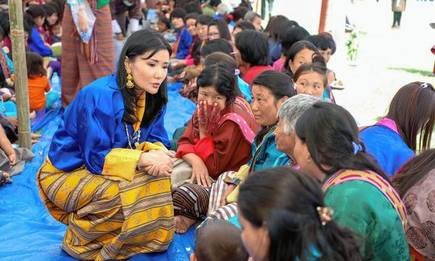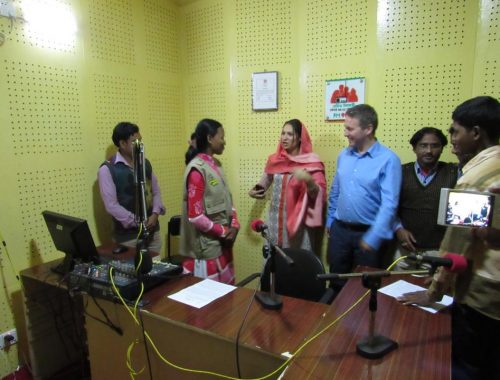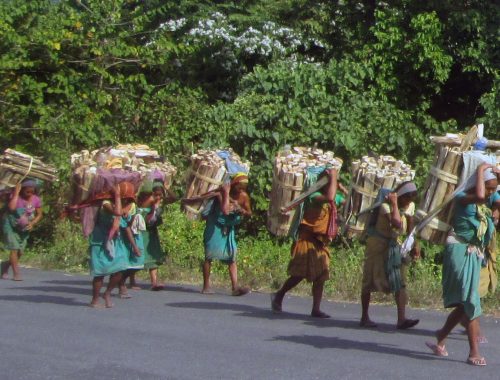By Suhasini Haidar
In a first for the Himalayan Kingdom, and a rare honour in the sub-continent, Bhutan’s Queen Mother Gyalyum Sangay Choden Wangchuck has been awarded the United Nations Population Award in the individual category for 2020 for her work on sexual health and ending gender violence.
The awardee in the organisational category is HelpAge India that works on elder care. Only two Indians have been awarded in the past four decades since the award was established in 1981: former Prime Minister Indira Gandhi in 1983 and industrialist-philanthropist J.R.D.Tata in 1992.
“It is of great honour to our region as the recipients of the prestigious UNFPA Population award this year, both in the individual and institutional category are from the Indian sub-continent,” the Bhutanese Queen Mother, who will receive the UN award on December 10, told The Hindu, in replies to questions from Thimphu. “I am truly humbled by this recognition for the achievements that Bhutan has made over the past decade in the areas of sexual and reproductive health.”
Enabling environment
In particular, the UN Population Fund (UNFPA) that announced the award said Gyalyum Sangay Choden, popularly called “Ashi Sangay” (Princess Sangay) has been recognised for creating “an enabling environment to openly discuss sexual reproductive health in the [Bhutanese] kingdom” and for founding a volunteer organisation called ‘Respect, Educate, Nurture and Empower Women’ (RENEW).
Since its start in 2004, RENEW has been involved in spreading sexual education amongst students, ensuring reproductive healthcare for women and counselling services. India has supported RENEW through the Embassy in Thimphu, and helped construct the RENEW crisis centre as well as Bhutan’s first shelter for victims of gender-based violence, “Gawailing Happy Home”.
57-year-old Gyalyum Sangay Choden Wangchuck is the youngest of four sisters, all married to Bhutan’s former monarch, the Fourth King Jigme Singye Wangchuck, who abdicated in favour of his son Jigme Khesar Namgyel Wangchuck in 2006. Despite the abdication, each of the Bhutanese royals stays engaged with public engagements and charity work, and much of Ashi Sangay’s work is supported by the Fourth and Fifth Kings and the Bhutanese government, as well as foreign grants.
Breaking taboos
In 1999, the Queen Mother was appointed UNFPA Goodwill Ambassador. Recounting the beginning of her fieldwork, which she clearly takes beyond celebrity endorsements and photo-ops, Ashi Sangay said sexual and reproductive issues were considered “taboo subjects” in Bhutan. Although the first case of HIV/AIDS in the country was detected in 1993, it was hardly spoken of. The numbers have grown to about 627 cases last year, a reason for some concern in a small country with a population of just 7,71,000 people.
“The initial years were very challenging as there was an inherent denial and non-acceptance to address sexual and reproductive health issues which were obviously prevalent in our society,” Ashi Sangay, told The Hindu. “Some of my travels have involved perilous journeys on foot, pony and even yaks through unforgiving terrain. Through these very personal interactions I was able to identify the needs of the people, especially women and children,” she adds, explaining the start of RENEW.
While Bhutanese women enjoy a status, a place in the workforce and property rights that are considered more equitable than much of the SAARC region, there are growing concerns about violence. A 2017 study by Bhutan’s National Commission for Women and Children found that as many as 14% of women surveyed had suffered physical violence that year, 4.5% suffered sexual violence and more than 72% had never sought help from anyone for it.
It is that gap that Ashi Sangay says she is trying to bridge, even as RENEW grapples with the new challenge of the Coronavirus pandemic. Although Bhutan has not had a single COVID-19 related death, and kept its patient count below 400, the Queen Mother says an increase in domestic violence against women and girls, who were forced to stay at home during the lockdown has been a growing concern, and her group of about 3,000 volunteers are trying to visit as many homes as possible as a way to monitor their situation.



